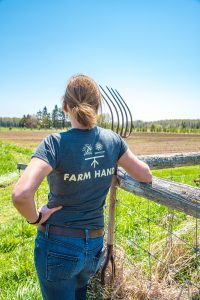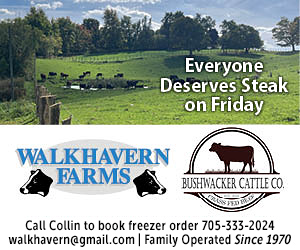We’ve all been there – you’re driving down a county road and you come upon a piece of farm machinery moving at a glacial pace. You can’t pass right away and have to wait until the road opens up. In our car-centric world where speed is of the essence, it’s easy to get frustrated and view the farmer as an impediment.
Next time you find yourself in that situation, think about this: agriculture is our second-largest industry in Southern Georgian Bay, second only to tourism. And farming is inextricably linked to tourism, with local food at the forefront of what drives our economy.
We love the rural lifestyle, but the demand for this lifestyle is creating more development, which is taking over land that was once agricultural. When I moved to Thornbury 18 years ago, a two-minute walk or bike ride from my condo took me into “farm country,” with apple orchards and grain fields around every corner. These days many of those orchards have been razed and the only thing growing in the formerly lush fields are streets, homes and condos.
It’s a tricky balancing act, and we need to be careful not to reach a tipping point where the demands of development lead to urban sprawl at the expense of our agricultural identity.
Thankfully, as Emily Worts writes in her article in this issue on the future of farming, a new breed of farmers is doing more with less. They’re entrepreneurs who are finding innovative ways to grow, tend and market their crops. They’re working closely with local markets, restaurants, tourism organizations and municipalities to come up with new and interesting ways to produce and promote local food. Their success is in turn bringing more tourists to the area looking for a day or weekend in the country partaking in local food and drink, shopping in local stores and enjoying local events and activities.
 The traditional idea of the “family farm” is already in jeopardy as successive generations move to the “big city” for more lucrative jobs that don’t involve rising before the sun to put in 16 or 20 hours of hard labour seven days a week, 365 days a year while battling the vicissitudes of weather, disease and equipment breakdowns. In many rural areas massive factory farms are taking over, turning agriculture into big business – and stinky business at that. If we don’t want factory farms eating up our landscape and replacing the “sweet smells of the country” with the acrid stench of pig and chicken manure by the tonne, we have to support the smaller farmers and keep them on the land.
The traditional idea of the “family farm” is already in jeopardy as successive generations move to the “big city” for more lucrative jobs that don’t involve rising before the sun to put in 16 or 20 hours of hard labour seven days a week, 365 days a year while battling the vicissitudes of weather, disease and equipment breakdowns. In many rural areas massive factory farms are taking over, turning agriculture into big business – and stinky business at that. If we don’t want factory farms eating up our landscape and replacing the “sweet smells of the country” with the acrid stench of pig and chicken manure by the tonne, we have to support the smaller farmers and keep them on the land.
So next time you find yourself behind a slow-moving farm vehicle, take a moment to appreciate the hard work and dedication of our farmers to feed not just their own families, but ours as well. They deserve our respect, admiration and protection. They are the embodiment of who we are and why we’re here.
Slow down, be patient and give that farmer a friendly wave of acknowledgement. And most importantly, buy local. ❧














